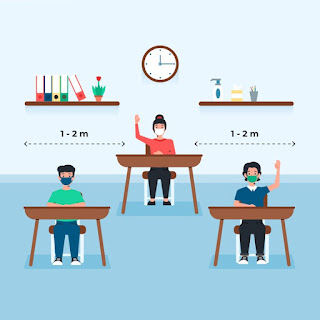It will be an entirely different experience for the students when the schools reopen after several months of lockdown. From the huddle during the morning assembly to the games during the lunch break, students will have to adapt to the new normal.
Schools across the world were shut soon after Coronavirus pandemic began to claim lives. But as the lockdown, imposed to curb the spread of virus, has begun to ease and people are gradually coming out to resume their lives, what remains to be seen is how the schools will run in post-Covid situation.
National Council of Educational Research and Training (NCERT) has mentioned in its draft recommendation, submitted to the Center, that the schools may reopen from Class 8 to Class 12 after the summer vacations in Green and Orange zone districts.
But how will schools look like in the new setting?
One of the things that shackles the new setup, experts say, is perhaps the conventional assessment patterns and the marks-ridden mindset. It remains to be seen whether Covid-19 can actually teach the schools that intelligence and mental prowess to go beyond assessments based on rote learning. If schools have to re-open with one-third strength, the lesson plans will have to lend themselves to those attending schools physically and the two-thirds attending classes remotely. Teachers will need to be constantly trying out new ways to bridge the gap between part virtual, part real-time learning. Flipped and blended modes will replace the traditional lecture model. Education in our country stands at the threshold of transformation.
The entire functioning of the schools will change after the schools reopen: school timings and time-tables will be different; classrooms and school buses will be emptier; reduced group activities; closed canteens; there may not be any sports or annual days or, for that matter, morning assemblies; parent-teacher meetings might be held virtually; school washrooms would be monitored closely to ensure it is not crowded; and lunch breaks will probably not remain the time to run into friends. Apart from books, parents will have to ensure their children are carrying hand sanitizer and face masks to school.
However, we believe that at this point it would be a “little pre-mature” to comment anything regarding concrete plans for the reopening of schools. The situation will have to be viewed and reviewed not only countrywide or city-wise but also at the local level.
In fact, we feel it will have to be further micro-managed. If there are three schools in the same lane, for instance, they will actually need to get into a discussion with each other before they can even start planning the modalities of safe distancing within their respective school gates.
Staggered timings, modes of transport, private vans to pick-up kids from several schools will need a serious rethink. In fact, it would not be surprising to see the local RWAs wanting a say in the matter as the safety of the local residents can't be compromised either.
The Standard Operating System (SOP) would be a new format in which the schools will function. Several school authorities say that they would strictly avoid activities that require social gatherings for at least a year.
The schools would avoid activities that require social gatherings for at least a year. Special care would also be given to ensure physical distancing in school buses, classes and during breaks. 'Dos and Don'ts' posters would be placed in every corridor to educate the children about the proper way of conducting themselves in the school premises in this scenario.
Health and hygiene will have to be the topmost priority of the schools after the students return to classes. In school, they would have to install a touch less sanitizing station. At the entrance, they would have to install automatic face recognition and thermal checking terminal as well, where every student and teacher will go through a touch less temperature check, and if anyone is not wearing a mask, the machine will raise an alarm.
The school management says they will put on hold all activities that may violate the social distancing norms.
Whether parents are willing to send their kids to school, so far, schools have received mixed feedback from parents. Some parents are willing to send their children to schools as they are either worried about the loss in academics or inability to attend online classes because of poor internet connection or are unable to work with kids at home. Many risk-averse parents are against the idea of schools opening until Covid-19 vaccination is out in the market. And it is a valid concern.
The schools are mulling over the idea of initiating a hybrid model where classroom programmes would run for children who are willing to attend the school while as an online programme would continue for children whose parents are not in favour of sending them to the school.
The common consensus among parents is that they do not want to send their children to schools yet.
Some schools are considering operating on the basis of odd-even. Furthermore, the syllabus will be reduced.
The schools are looking at a hybrid blend of learning. If the students don’t have a laptop or desktop at home, we will send the recorded lessons to the students on their parents’ phones. This will reduce the seat time of the students and the teachers.






1 Comments
Free Treatment in India
ReplyDelete